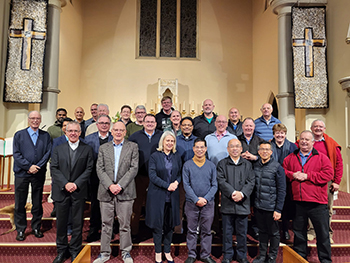Clergy workload, mental health and cultural challenges for overseas-born priests were some of the issues discussed at a recent national gathering of clergy life and ministry diocesan directors.
The June 26-29 conference in Sydney saw 30 diocesan directors gather for the first time since the last national meeting in 2019. The conference serves as a way for clergy to build fraternity, develop support networks and reflect upon shared joys and challenges.
Chair of the national clergy life and ministry’s interim committee, Fr Wim Hoekstra, said the first part of the conference was spent discussing some of the common challenges priests were facing nationally.
“The main issues were, firstly, the mental health of clergy, especially those who were isolated, especially in the country and regional dioceses, where they are very much by themselves and the nearest priest might be a couple of hundred kilometres away,” he said.
 A priest for almost 45 years and the vicar for clergy in the Diocese of Parramatta, Fr Wim said the Church is starting to put various strategies in place in an effort to support the mental health of priests, which has become a growing concern in recent years.
A priest for almost 45 years and the vicar for clergy in the Diocese of Parramatta, Fr Wim said the Church is starting to put various strategies in place in an effort to support the mental health of priests, which has become a growing concern in recent years.
“There’s always the priest wanting to … be positive and happy, where maybe internally he’s struggling with not only his ministry, but also just in his own mental capacity, and that was brought forth very much during COVID-19,” he explained.
“The city dioceses have lots of support, but it’s the regional dioceses that often struggle with this.”
Another common challenge identified by clergy life and ministry directors was the difficulties that priests coming from overseas can face when placed in a parish setting.
“The second issue raised was around the overseas-born clergy, whom we warmly welcome, but who often face cultural issues with language and ways of doing things,” Fr Wim said.
“We’re trying to work on that, but that’s an issue that’s come up over the years.”
During the conference, time was allocated to discussing the requirements of the Royal Commission into Institutional Responses to Child Sexual Abuse for supervision of clergy, which has been mandated in many dioceses, but remains unclear in parts. Attendees at the conference discussed some of the finer details and specificities of the requirements, such as what constitutes suitable supervision, the frequency required and who oversees the process.
The workload and pressure clergy face were also explored – another factor that has proven to contribute to the mental health and wellbeing of priests.
“Parish priests who have other roles can spend a lot of their time behind the desk rather than trying to go out and be available for various ministries or visitation,” Fr Wim said.
“In many of the country dioceses, it’s very hard to get a supply priest to come and look after a parish, so that the priest can take a break, and that’s causing part of the mental health and stress for priests.”
With an ageing clergy meaning more priests moving into retirement, the workload for most urban priests appears to be increasing, Fr Wim said. According to the latest Census, there were 2,900 priests in Australia in 2021, but this number has dropped by about 25 per cent since 1971.
The second part of the conference was focused on learning how to deal with change, with Dr David Paul, a lecturer at Australian Catholic University and a consultant in change management, leading attendees through a series of six sessions.
A key theme from this part of the conference, Fr Wim said, was that mission is a way of “being” as opposed to simply “doing”.
“These sessions were very enlightening, very enjoyable and very challenging, because it reminded us that we needed to change our brain to change our mind,” he said.
“Our brain is so used to ‘doing’ that we forget about ‘being’, and that was ultimately the principal learning. It helped us to prioritise what we are doing and maybe just change the way in which we do things.”
Images: Supplied
Words: Matthew Biddle



